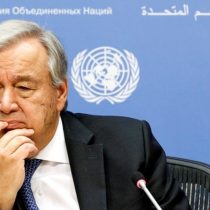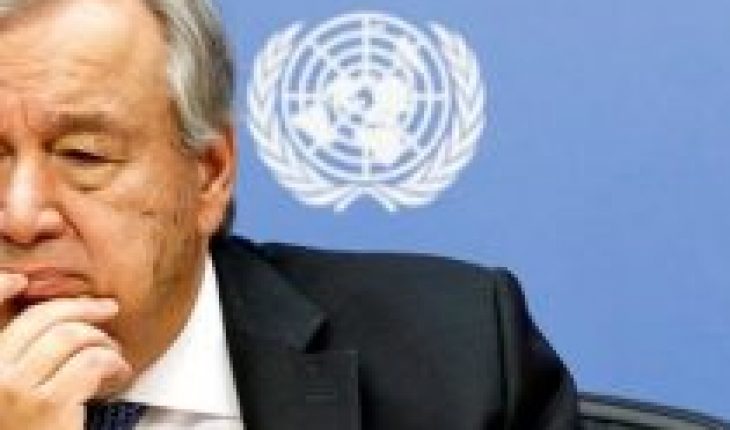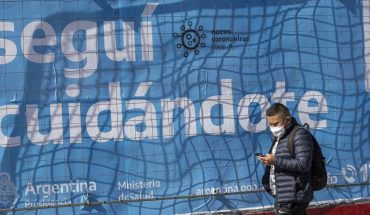
Latin America needs a strong economic injection from the world’s richest countries to overcome the coronavirus pandemic and its consequences. This is stated by UN Secretary-General António Guterres in an interview with EFE Agency.
For the Portuguese diplomat, the region – already one of the epicentres of the crisis – must seek a “balance” between the response to the disease and the economic reopening, but it cannot in any way mean giving the virus free rein.
It therefore demands “great solidarity” from the international community, including measures to relieve public debt and much more generous aid to countries hosting the millions of Venezuelans who have left their homes.
Question: The world is experiencing a particularly convulsed moment. The pandemic, conflicts, now the wave of protests in the U.S., do you think we’re facing a change of era?
Sergey Sergey: We are, I believe, in the most dramatic crisis since World War II and inevitably there will be changes, but it is not yet clear in what direction we are going to change. I am hopeful that the world will recognize the fragility of our societies, the planet, that it understands that humility is necessary, that solidarity and unity are essential and that multilateral institutions must be strengthened.
We must fight nationalism, populism, xenophobia, racism, which divides us. We must understand that – with climate challenges, pandemics, the evolution of science and technology – we need to be much stronger and we will only be much stronger with unity and with a perspective of greater global governance, of more shared sovereignty, of stronger multilateral institutions.
But this is something that is not yet guaranteed. Many will try to take advantage of the current situation to deflate multilateral institutions, to accentuate nationalisms, to accentuate selfishness, to increase inequalities. We need to come together to recover from COVID and all other problems with a strategy of more sustainability and more inclusion.
If we get this, there’ll be a change and a change for the better. If we don’t make it, there will be a change, but unfortunately a change for the worse.
Q: Precisely in this crisis you see countries that do the opposite. The U.S. announced a few days ago its breakup with the World Health Organization, for example What is its response?
A: That multilateral institutions need not be strengthened, not deflated, and that the capacity for coordination of pandemic response needs to be strengthened.
At the moment we must support the World Health Organization, ensure that it has the necessary funds for all the action it has in developing countries, to enable us to be able to defeat this pandemic as quickly as possible.
Q: Latin America is a new epicenter of coronavirus. Do you think countries are rushing with the reopening?
A: For developing countries this is a very dramatic situation, because on the one hand there is COVID and the impact on the deaths and suffering of the people, and on the other hand there is the impact of the economic crisis, and for many it is also a threat to their lives.
Balance needs to be found, but balance cannot be based on giving the pandemic free course. Balance needs to ensure a strong will to fight the pandemic and Latin America is the new epicenter. 800,000 infected, more than 38,000 dead, and in many countries that have health systems that are not strong enough. I believe that Latin America naturally needs appropriate strategies to combat the crisis, but a great solidarity of the international community, especially the countries of the North, of the developed countries, to enable Latin America to have the resources to combat the pandemic and to reduce economic and social impacts.
Q: Do you have a number in your head about the financial support the region needs?
A: We have been stating from the outset that a two-digit momentum of the economy is needed, at least 10%. And this is true on a global level. We are seeing this in developed countries, in the United States and in Europe, which roughly corresponds to the size of recovery and pandemic combat programmes. I believe that this is the volume of resources that should be available to developing countries.
But at the same time you have to recognize that in Latin American and Caribbean countries there is a very dramatic debt situation. There were important measures, the G20 approved a debt suspension of the poorest economies, but the debt problem is more widespread, and there are many developing countries and middle-income countries that do not have access to financial markets in the current situation and need debt relief.
Q: What can be done with private creditors? We are seeing difficulties, for example in the case of Argentina.
A: I think a very strong dialogue with private institutions is very important (…) because this has no solution without their cooperation and many countries have hesitation in taking steps to reduce debt or suspend payments if they think that this will not benefit countries, but only private creditors.
I believe that a common effort, naturally understanding the interests of all in a spirit of dialogue, is necessary.
Q. It has recently drawn attention to the situation of migrants and refugees to COVID-19, a major problem in Latin America, with millions of Venezuelans outside the country, with a lot of movement in Central America and Mexico…
A: This is a fundamental concern for us: migrants and refugees in Latin America and around the world, very vulnerable populations. They are absolutely needed to be integrated into the health systems of the host countries, but very strong international solidarity is also needed.
Speaking of Venezuela, the most dramatic case of migration in Latin America. The truth is that the international community’s solidarity with host countries has been very small. The last donor conference was positive, but we need much more support to host countries for effective integration of migrants and refugees into their health systems and in the social protection responses that are needed.
Q: Spain has been one of the places most hit by the pandemic, while its country, Portugal, has been the one that has brought the crisis the best. What can be learned from what portugal has done?
A: I think it is important to see that the countries that were able to act earlier, to take strong action earlier, were the ones that were most successful so far in containment. But let’s not forget that the pandemic has moving epicenters. It started in China, Europe, here in the United States, now Latin America. And a new wave can reach the global North. We must ensure that the action does not end (…) and not to think that the successes that were had in the past allow us to forget the need to maintain a strong determination.
Q: In the face of protests against racism in the U.S., what is your message to the demonstrators and President Donald Trump?
A: In situations like this, States need to have the ability to hear the concerns, the claims of the peoples, their hopes. And at the same time that the peoples speak peacefully and that the authorities respond with retenance, avoiding violence. That’s the most important thing.
At the same time, you have to understand that diversity is a wealth, it is not a threat. It is a wealth that needs to be cultivated, that needs a very strong investment in social cohesion.
I think this is very important in all parts of the world where we see a greater distance between peoples and governments. Trust must be rebuilt and we must also rebuild the cohesion of our societies, the social contract.
Q: Among all these problems in the world, are you seeing something that creates hope?
A: People’s generosity. So many examples of admirable solidarity. Health workers, how many, at risk of their lives, are saving lives. The dedication of humanitarian workers who go to the most dangerous points in the world (…) There are so many admirable examples of solidarity that show that human nature is something we can trust for the future.
Leaders need to understand this and have leaders take it on.





